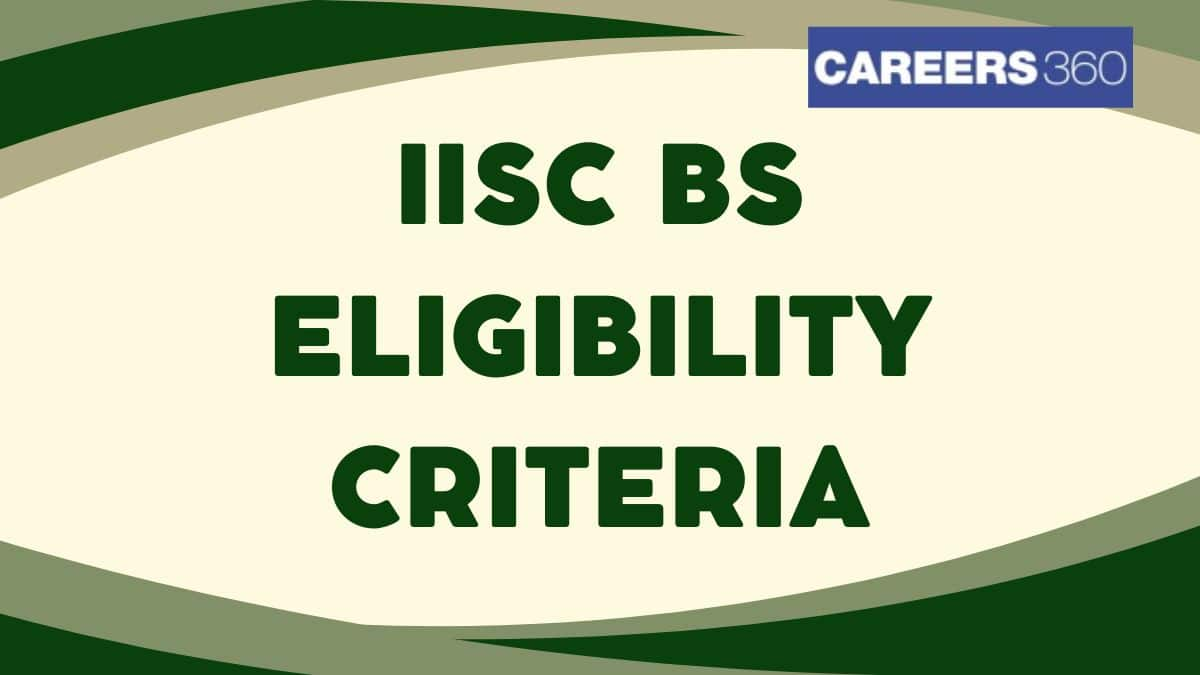IISc BS Eligibility Criteria 2025 - Age Limit, Nationality, Aggregate Marks
IISc BS Eligibility Criteria 2026 - IISc Bangalore will release the IISc BS 2026 eligibility criteria on the official website. The eligibility criteria are the minimum conditions to apply for the IISc BS admission 2026. Candidates must have passed 10+2 from a recognized board with Physics, Chemistry, and Mathematics to apply for admission. IISc BS eligibility criteria 2026 will comprise education qualification. The admission to IISc BS will be based on the scores secured in JEE Main, JEE Advanced or KVPY. Candidates can check the full article to know more about IISc BS Eligibility Criteria 2026.
IISc BS 2026 Eligibility Criteria

Before applying for the admission process, the candidates are advised to thoroughly check the eligibility criteria of IISc BS 2026. The eligibility criteria will be updated on this page after the official release. Candidates who meet the minimum eligibility criteria will be able to fill out the IISc BS 2026 application form.
Candidates can check the following IISc BS eligibility criteria 2026:
10+2 Qualifying Exam Criteria
Candidates should have completed their 12th standard qualifying exam in 2026. However, those candidates who qualify the exam in 2026 will also be seen as eligible.
In the 10+2 qualifying exam, the candidates should have studied Physics, Chemistry and Mathematics as compulsory subjects.
Biology, Electronics, Statistics, Computer Science and more along with Physics, Chemistry and Mathematics should have been studied.
Atleast 60% marks or first grade (or equivalent grade) in 12th standard (or equivalent) examination should have been secured.
Qualifying Entrance Exams
The following examinations will be eligible for IISc BS admission 2026:
Kishore Vaigyanik Protsahan Yojana (KVPY)
Eligibility Criteria of IISc BS 2026 for Kishore Vaigyanik Protsahan Yojana (KVPY)
S.No | Name of Exam | Year | Fellowship Selection |
1 | KVPY-SA | Appeared in 2019 | Selected for fellowship |
2 | KVPY-SB | Appeared in 2020 | Selected for fellowship |
3 | KVPY-SX | Appeared in 2020 | Selected for fellowship |
4 | KVPY-SA and SX Fellows | - | Selected |
Eligibility Criteria of IISc BS 2026 for JEE Main Candidates
S.No. | Category | Minimum marks required in JEE Main |
1. | General | 60% |
2 | Other backward Class (Non- Creamy layer | 54% |
3. | Schedule Caste, Schedule Tribe and Physically challenged | 30% |
Eligibility Criteria of IISc BS 2026 for JEE Advanced Candidates
S.No. | Category | Minimum marks required in JEE Advanced |
1. | General | 60% |
2. | Other Backward Classes (Non- Creamy layer | 54% |
3. | Schedule Caste, Schedule Tribe and Physically Challenged | 30% |
IISc BS Admission 2026 Reservation Criteria
The authorities will reserve various seats for candidates belonging to Scheduled Tribe (ST), Scheduled Caste (SC), Other Backward Classes (OBC), Persons with Disability and Kashmiri Migrants as per the regulations of the Government of India. All of the requirements specified by the authorities have to be met for reservations. During admissions, the documents to prove eligibility have to be submitted otherwise the candidates will be disqualified.
IISc BS 2026 Application Form
The authority will release the IISc BS application form 2026 on the official website. The eligible candidates can fill out the application form of IISc BS 2026 online. The application process comprises registration, form filling, uploading documents, and payment of fees. The registered candidates will be allowed to participate in the admission process. The required fee also has to be paid by the candidates.
List of Related colleges
Questions related to IISc Bangalore
On Question asked by student community
Hello,
You cannot take admission in both IISc (BS-MS Research) and AMU/JMI (BA course) at the same time. All these programmes are full-time regular courses, and as per UGC rules, a student is not allowed to pursue two full-time degrees simultaneously from recognized universities.
If you qualify for IISc through
Hello dear candidate,
Yes, you can apply for an integrated at IISc but only if your B.Sc. in medical laboratory technician is recognized as a science degree (biological or chemical sciences) and should include subjects like:- biology, chemistry, or biochemistry.
IISc may not accept you if your course is more
Success with a late start is difficult but not impossible.Your exam dates depend on which test you are targeting most probably it is in april and may you have more than 6 months to prepare.
you can start your preparation with highly focused study plan, prioritizing high-weightage topics and taking
Hey ,
The Jee mains cutoff for iisc Bangalore differ from category to category. Like for general the cutoff rank ranges 903 for obc category it ranges around 1,655 for ews category it ranges around 1,214 for sc category it ranges around 581 for st category it ranges around 314
IISc Bangalore does not offer a B.Tech or undergraduate program in Aeronautical Engineering through JEE Main. IISc offers a B.Sc (Research) program for undergraduate students, and admission to this is possible through JEE Advanced, not JEE Main.
For M.Tech in Aerospace Engineering at IISc, admission is through GATE, not JEE.
Applications for Admissions are open.
Among top 100 Universities Globally in the Times Higher Education (THE) Interdisciplinary Science Rankings 2026
Amrita University B.Tech 2026
ApplyRecognized as Institute of Eminence by Govt. of India | NAAC ‘A++’ Grade | Upto 75% Scholarships
Amity University-Noida M.Tech Admissions 2026
ApplyAmong top 100 Universities Globally in the Times Higher Education (THE) Interdisciplinary Science Rankings 2026
MIT World Peace University B.Tech Admissions 2026
ApplyHighest CTC 44.14 LPA | UGC Approved | 1600+ Recruiters | 100% Placement
Manav Rachna-B.Tech Admissions 2026
ApplyNAAC A++ Grade | Recognized as Category-1 Deemed to be University by UGC | 41,000 + Alumni Imprints Globally
Chandigarh University Admissions 2026
ApplyNAAC A+ Accredited | Among top 2% Universities Globally (QS World University Rankings 2026)
